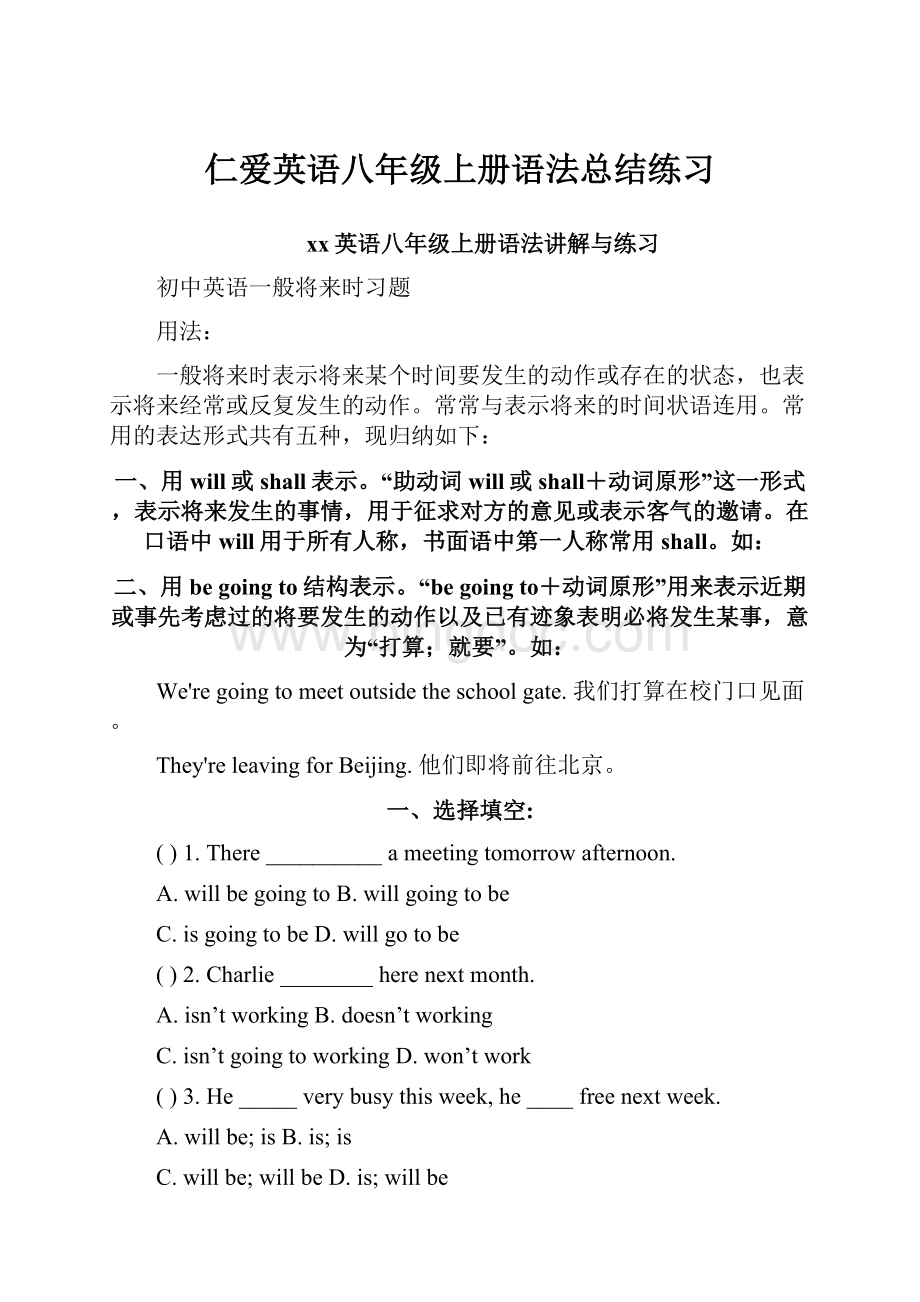仁爱英语八年级上册语法总结练习.docx
《仁爱英语八年级上册语法总结练习.docx》由会员分享,可在线阅读,更多相关《仁爱英语八年级上册语法总结练习.docx(17页珍藏版)》请在冰点文库上搜索。

仁爱英语八年级上册语法总结练习
xx英语八年级上册语法讲解与练习
初中英语一般将来时习题
用法:
一般将来时表示将来某个时间要发生的动作或存在的状态,也表示将来经常或反复发生的动作。
常常与表示将来的时间状语连用。
常用的表达形式共有五种,现归纳如下:
一、用will或shall表示。
“助动词will或shall+动词原形”这一形式,表示将来发生的事情,用于征求对方的意见或表示客气的邀请。
在口语中will用于所有人称,书面语中第一人称常用shall。
如:
二、用begoingto结构表示。
“begoingto+动词原形”用来表示近期或事先考虑过的将要发生的动作以及已有迹象表明必将发生某事,意为“打算;就要”。
如:
We'regoingtomeetoutsidetheschoolgate.我们打算在校门口见面。
They'releavingforBeijing.他们即将前往北京。
一、选择填空:
()1.There__________ameetingtomorrowafternoon.
A.willbegoingtoB.willgoingtobe
C.isgoingtobeD.willgotobe
()2.Charlie________herenextmonth.
A.isn’tworkingB.doesn’tworking
C.isn’tgoingtoworkingD.won’twork
()3.He_____verybusythisweek,he____freenextweek.
A.willbe;isB.is;is
C.willbe;willbeD.is;willbe
()4.There_______adolphinshowinthezootomorrowevening.
A.wasB.isgoingtohave
C.willhaveD.isgoingtobe
()5.–________you________freetomorrow?
–No.I________freethedayaftertomorrow.
A.Are;goingto;willB.Are;goingtobe;will
C.Are;goingto;willbeD.Are;goingtobe;willbe
()6.Mother________meanicepresentonmynextbirthday.
A.willgivesB.willgive
C.givesD.give
()7.–ShallIbuyacupofteaforyou?
–________.(不,不要。
)
A.No,youwon’t.B.No,youaren’t.
C.No,pleasedon’t.D.No,please.
()8.–Whereisthemorningpaper?
–I________ifforyouatonce.
A.getB.amgetting
C.togetD.willget
()9.________aconcertnextSaturday?
A.TherewillbeB.Willtherebe
C.TherecanbeD.Thereare
A.haveB.willhave
C.hadD.wouldhave
()11.He________herabeautifulhatonhernextbirthday.
A.givesB.gave
C.willgivingD.isgoingtogiving
()12.He________tousassoonashegetsthere.
A.writesB.haswritten
C.willwriteD.wrote
()13.He________inthreedays.
()14.Ifit________tomorrow,we’llgoroller-skating.
A.isn’trainB.won’train
C.doesn’trainD.doesn’tfine
()15.–WillhisparentsgotoseetheTerraCottaWarriorstomorrow?
–No,________(不去).
A.theywilln’t.B.theywon’t.
C.theyaren’t.D.theydon’t.
()16.Who________we_____swimmingwithtomorrowafternoon?
A.will;goB.do;go
C.will;goingD.shall;go
()17.We________theworkthiswaynexttime.
A.doB.willdo
C.goingtodoD.willdoing
()18.Tomorrowhe________akiteintheopenairfirst,andthen________boatinginthepark.
A.willfly;willgoB.willfly;goes
C.isgoingtofly;willgoesD.flies;willgo
()19.Thedayaftertomorrowthey_______avolleyballmatch.
A.willwatchingB.watches
C.iswatchingD.isgoingtowatch
()20.There________abirthdaypartythisSunday.
A.shallbeB.willbe
C.shallgoingtobeD.willgoingtobe
二、动词填空:
1.I______(leave)inaminute.I______(finish)allmyworkbeforeI______(leave).
2.Mike____________(go,not)tothecinemathisafternoon.
3.Allofus____________(plant)treesonBaiyunhillnextFriday.
4.I______(be)tired.I______(go)tobedearlytonight.
5.Mary’sbirthdayisnextMonday.Hermother_____(give)herapresent.
6.Alotofpeople____________(visit)theSummerPalacenextmonth.
情态动词的用法和习题
1.can(could)
1)表示能力,could主要指过去时间。
注意:
Can表示一贯的能力,beableto表示客观能力和通过努力可以达到的能力
2)表示允许。
例如:
①CanIhavealookatyournewpen?
我可以看一看你的新钢笔吗?
Could/can+havedone结构表示对过去发生的事情的“怀疑”或“不肯定”。
could加完成式还用于肯定句时一般表过去可能完成而却未完成的动作。
2.may(might)
1)表允许,might可以指过去时间,也可指现在时间,语气更委婉。
在回答以may引起的问句时,多避免用这个词,而用其它方式,如Yes,please./Certainly./Pleasedon’t./You’dbetternot./No,youmustn’t.等,以免显得太严峻或不客气。
3)may/might推测性用法可能
注意:
(1)只用于肯定和否定句中,不用于疑问句中。
(2)might比may可能性更小
3.must
1)表示义务。
意为“必须”(主观意志)。
例如:
2)mustbe+表语的结构,通常表示猜测,含有“一定”之意。
(只用在肯定句中)
3)must的否定式有两个:
当回答由must引起的问题时,否定答复要用needn’t或don’thaveto表示“不必”、“无须”、“用不着”、“不一定”的意义。
当表示“不应该”、“不许可”、“禁止”时,就用mustnot。
5)区别:
haveto的含义与must是很接近的,只是haveto比较强调客观需要,must着重说明主观看法。
4.shall
1)表征询意见,用于
一、第三人称疑问句。
例如:
2)表说话人的意愿,有“命令、允诺、警告、决心”等意思,用于
二、第三人称陈述句。
5.should
1)用于第一人称疑问句中询问对方的意愿,但语气较委婉温和,如:
2)表示应该、必须,常与must换用。
例如:
6.will和would的用法
1)表示意志,决心或愿望。
2)will表示经常性、习惯性、倾向性,would表示过去的习惯行为。
3)用于第二人称作主语的疑问句中,表示对对方的请求,would的语气比will委碗
7.oughtto
表义务,意为“应该”(因责任、义务等该做),口气比should稍轻。
8.usedto
1)表示过去的习惯动作或状态,现在不复发生或存在。
疑问式和否定式有两种。
usedto+v意为“过去常常”,“过去一直”;beusedto+v-ing/n(名词)意为“习惯于”;beusedto+v意为“被用来(做某事)”。
二、情态动词表推测:
1.can表示可能(理论上或是逻辑判断上)。
2.may表可能(事实上)。
可以指过去时间,也可以指现在时间,但语气更加不肯定。
3.must表示揣测。
意为“想必、准是、一定”等,只用于肯定句。
4.should表推测,意为“想必一定、照说应该、估计”等。
5.oughtto表推测,暗含很大的可能,语气较弱。
6.could可能性不大,语气较弱。
7might可能性最小,语气最弱。
表示可能性大小的顺序为:
must>will>would>oughtto>should>can>could>may>might
情态动词练习题
1.Jackdescribedhisfather,who_______abraveboymanyyearsago,asastrong–willedman
A.wouldbeB.wouldhavebeen
C.mustbeD.musthavebeen
2.You_______buyagift,butyoucanifyouwantto.
A.mustB.mustn'tC.havetoD.don'thaveto
3.Ihavetoldyouthetruth.______Ikeeprepeatingit?
AMustBCanCMayDWill
4.I_______havewatchedthatmovie—it’llgivemehorribledreams.
A.shouldn’tB.needn’tC.couldn’tD.mustn’t
5.Mark_______havehurried.Afterdrivingattopspeed,hearrivedhalfanhourearly.
A.needn’tB.wouldn’tC.mustn’tD.couldn’t
6._______Itakethebookout?
—I'mafraidnot.
A.WillB.MayC.MustD.Need
7.Justbepatient.You______expecttheworldtochangesosoon.
A.can’tB.needn’tC.maynotD.whether
8.—Ihaven’tgotthereferencebookyet,butI’llhaveatestonthesubjectnextmonth.
—Don’tworry.You______haveitbyFriday.
couldB.shallC.mustD.may
9.MayItakethisbookoutofthereadingroom?
No,you______.Youreaditinhere.
A.mightn’tB.won’tC.needn’tD.mustn’t
10.Doctorssaythatexerciseisimportantforhealth,butit_______beregularexercise.
A.canB.willC.mustD.may
11.---Goodmorning.I'vegotanappointmentwithMissSmithinthePersonnelDepartment.
--Ah,goodmorning.You_______beMrs.Peters.
A.mightB.mustC.wouldD.Can
12.“You____haveawrongnumber,”shesaid.“There’snooneofthatnamehere.”
A.needB.canC.mustD.would
13.---Sorry,ProfessorSmith.Ididn'tfinishtheassignmentyesterday.
---Oh,you____havedoneitasyesterdaywasthedeadline.
mustB.mustn'tC.shouldD.shouldn't
14.Bobwouldhavehelpedusyesterday,buthe-_______
A.wasbusyB.isbusyC.hadbeenbusy.D.willbebusy
15.Johnwenttothehospitalalone.Ifhe_______meaboutit,Iwouldhavegonewithhim.
A.shouldtellB.tellsC.toldD.hadtold
16.Georgeisgoingtotalkaboutthegeographyofhiscountry,butI’dratherhe_______moreonitsculture.
A.focusB.focusedC.wouldfocusD.hadfocused
17.Ifwe___theotherroad,wemighthavearrivedhereintimeforthemeeting.
A.takeB.hadtakenC.tookD.havetaken
18.--Theweatherhasbeenveryhotanddry.
--Yes.Ifithadrainedevenadrop,thingswouldbemuchbetternow!
Andmyvegetables.
wouldn'tdieB.didn'tdie
C.hadn'tdiedD.wouldn'thavedied
A.wouldhavebeensavedB.hadbeensaved
C.willbesavedD.wassaved
20.It’stheoffice!
Soyou___knoweatingisnotallowedhere.—Oh,sorry.
A.mustB.willC.mayD.need
21.Whatdoyoumean,thereareonlytentickets?
There___betwelve.
A.shouldB.wouldC.willD.shall
22.—Idon’tcarewhatpeoplethink.—Well,you_______
A.couldB.wouldC.shouldD.might
23.Ican’tfindmypurseanywhere.—Youhavelostitwhileshopping.
A.mayB.canC.shouldD.would
24.ItisusuallywarminmyhometowninMarch,butitberathercoldsometimes.
A.mustB.canC.shouldD.would
25.—How’syourtouraroundtheNorthLake?
Isitbeautiful?
—It____be,butitisnowheavilypolluted.
A.willB.wouldC.shouldD.must
26.What’sthename?
Khulaifi.____Ispellthatforyou?
A.ShallB.WouldC.CanD.Might
27.John,lookatthetime.____youplaythepianoatsuchalatehour?
A.MustB.CanC.MayD.Need
28.—Catherine,Ihavecleanedtheroomforyou.
—Thanks.You____it.Icouldmanageitmyself.
A.needn’tdoB.needn’thavedone
C.mustn’tdoD.shouldn’thavedone
—I’lltellMaryabouthernewjobtomorrow.
—You____herlastweek.
A.oughttotellB.wouldhavetoldC.musttellD.shouldhavetold
30.—Excuseme.IsthistherightwaytotheSummerPalace?
—Sorry,Iamnotsure.Butit____be.
A.mightB.willC.mustD.can
感叹句
感叹句是表达喜、怒、哀、乐以及惊奇、惊讶等强烈感情的句子。
感叹句通常由what或how引导。
"what"和"how"与所修饰的词置于句首,其它部分用陈述句语序。
一、由"what"引导的感叹句:
"what"意为"多么"用作定语,修饰名词(被强调部分),单数可数名词前要加不定冠词a/an,复数可数名词或不可数名词前不用冠词。
这类句子的结构形式是:
what+(a/an)+adj.+n.+主语+谓语.
由"how"引导的感叹句:
"how"意为"多么",用作状语,修饰形容词或副词(被强调部分)。
如果修饰形容词,则句中的谓语动词用系动词;如果how修饰副词,则句中的谓语动词用行为动词,这类句子的结构形式是:
How+adj.(adv.)+主语+谓语.
感叹句往后看形容词后是名单就用whata或whatan形后若是不可数或名复数只用what就可以形容词后乱糟糟只写how就OK了
填入适当的词完成下列感叹句。
1).________difficulthomeworkwehadyesterday!
2).________cutedogitis!
3).________interestingthestoryis!
4).________badtheweatherinEnglandis!
5).________honestboyTomis!
6).________tastysmellthecakegaveoff!
7).________goodtimewehadonthebeachyesterday!
8).________excitingnewsyou'vebroughtus!
9).________coolyournewcaris!
10).________scarythesetigersare!
选择填空。
1._______fasttheboyran!
A.HowB.HowanC.WhatD.Whatan
2._______wellyousingbut_______badlyhedances!
A.How,howB.What,what
C.How,whatD.What,how
3.________deliciousthesoupis!
I’dlikesomemore.
A.HowB.HowanC.WhatD.Whatan
4._______foolstheywere!
Theybelievedwhatthemansaid.
A.HowB.HowanC.WhatD.Whatan
5._______foolishtheywere!
Theybelievedwhatthemansaid.
A.HowB.HowanC.WhatD.Whatan
6._______difficultquestionstheyare!
Ican’tanswerthem.
A.HowB.HowanC.WhatD.Whatan
7.Imissmyfriendverymuch._______Iwanttosee